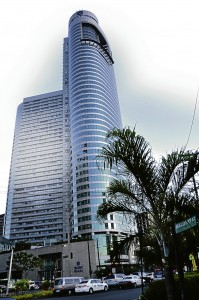Green condos worth 15% more, wanted by 63% of buyers

THE RCBC Plaza in 2003 placed third in the Energy Efficient Buildings of the Asean Energy Awards. Some of its green features could be a model future green condos can follow. photo by Tessa R. Salazar
Globally, the real estate industry is also undergoing a buyers’ “climate change” of sorts. Property analysts are observing that more and more developers, as well as individual buyers, want more “green” in their properties.
Enrique Soriano, a professor at the Ateneo Graduate School of Business and senior adviser at Wong+Bernstein Business Advisory, revealed why during one of his lectures:
According to a recent survey, 63 percent of buyers are motivated by the lower operating and maintenance costs that come with energy- and resource-efficient condos. And then the property markedly increases in value.
Citing an article in the January 2008 edition of SmartMoney, Soriano quotes, “A green property typically appraises 10 to 15 percent higher than comparable conventional homes.”
Soriano said that four years ago, research by the National Association of Realtors on home buyers’ preferences, published in the New York Times in November 2007, showed that demand for green housing has been growing: 46 percent of buyers would like a green home.
The catch is, supplies are limited.
“After Metro Manila, eco-friendly condos in transit-oriented developments (TODs) should now be seriously considered in Cebu, Davao, Baguio, Iloilo and Bacolod, including Subic and Clark, Cagayan de Oro and General Santos,” he said.
Soriano said condo living in TODs maximizes the connection between people and their neighborhood—connecting people to jobs, nature, shops, services and, most importantly, to each other.
Terrible pollution
There is one piece of advice for being near mass transport systems. Alejandro S. Mañalac, chair of the National Real Estate Association, previously told the Inquirer that TODs also bring people closer to the “terrible pollution prevalent in major cities, such that condo dwellers cannot open their windows, which were actually intended to provide natural ventilation. Furthermore, the noise from the buses, jeepneys and the LRTs and MRTs (unlike the subways of some neighboring countries) themselves can be heard all the way to the top floor of some condos, especially those units facing the road. The result is the continuous use of air-conditioning units to keep the smoke and the noise out. Thus, while some condos minimize fuel consumption, others can increase electric consumption.”
But then Soriano’s lecture also pointed out how eco-friendly condos in TODs save families money on their second largest expense—transportation. Then, it produces positive results in traffic safety and public health and creates a larger tax base.
The green standard
For many real estate developers, TODs are now the green standard in community design. There are many advantages, including: increased profits; future tax rebates/incentives (by legislation); favorable energy audits, higher energy-efficiency values; better options for materials and equipment; a sustained and predictable asset value; the goodwill and image; corporate social responsibility; and brand loyalty.
For buyers, eco-friendly condos would make a lot of sense. Here are some of the reasons:
The earth-friendly condo requires a smaller lot area to house more people.
Location encourages walking or use of mass transport.
Water and electricity bills are low.
Amenities respect natural resources.
Materials used are sustainable and nontoxic.
Amado de Jesus, founding chair of the Philippine Green Architecture Movement, disclosed that ideally, high-rise condos, with their small building footprint, minimize the extensive use of the land, thereby freeing it for other low-rise and green developments.
“However, a condo project can only be considered truly green if it is climatically designed to adapt to its natural environment,” he noted.
Mañalac, during a previous interview, said generally, condos “save precious land which can be used for planting trees.”
De Jesus warned the public of unscrupulous developers hyping their projects as earth-friendly with no solid basis. “Don’t be fooled by all the hype about installed solar panels, landscaping, and so-called green roofs.” They must be substantiated and properly certified by expert parties to be actually classified as green, he stressed.
